Researcher Assaulted After Armita Geravand's Burial Reveals Ordeal
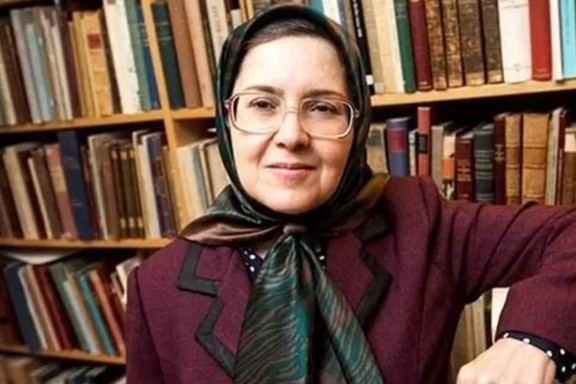
New details have emerged of the physical assault on mourners attending the funeral of 16-year-old Armita Geravand, who died after a confrontation with hijab enforcers.

New details have emerged of the physical assault on mourners attending the funeral of 16-year-old Armita Geravand, who died after a confrontation with hijab enforcers.
Sedigheh Vasmaghi, a writer and Islam researcher, known for her stance against mandatory hijab, shared her experience after her arrest at the funeral on the Zeytoon website.
She said: "Two women were also among the attackers, dressed in uniform under their veils. The four assailants began their assault. One was shouting, one was trying to take my bag, and one was hitting me while uttering indecent language."
Referring to the death of Armita, a girl who, like Mahsa Amini, died in the hands of morality police, Vasmaghi added: "I asked them, 'You have taken one life, and her memorial is here. Do you intend to take mine here as well?' They forcibly dragged me for about ten to fifteen meters."
The burial and memorial service for Armita took place in Tehran last Sunday, with several more attendees arrested. Among them was also Nasrin Sotoudeh, a prominent human rights lawyer and activist, detainees all reportedly subjected to physical abuse during their apprehension.
On the day of the funeral, reports received by Iran International indicated that Vasmaghi was attacked by security officers after departing the ceremony. However, with the assistance of concerned citizens, she managed to escape the clutches of four male and female attackers.
Despite a week having passed since the assault by security forces, the status of some detainees remains unknown. Negar Ostad Agha, a journalist and senior editor at Etemad Online is currently detained in Gharchak Prison near Tehran, with no specific information available regarding her situation.
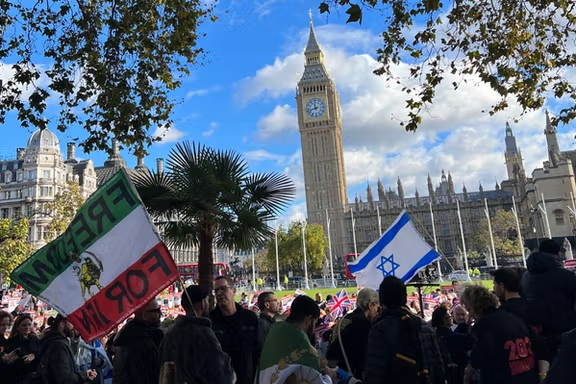
Amid a wave of pro-Palestinian rallies across the world, hardliners in Iran are admitting that the general public there have little appetite for the Palestinian cause.
Iran has seen no grassroot, popular expression of solidarity with Palestinians, except by groups supported by and loyal to the regime, since Israel began its onslaught on Gaza in retaliation for Hamas’ attack of October 7.
This is despite the fact that the Islamic Republic of Iran is the main supporter of Hamas –or perhaps because of it.
Nasser Imani, a conservative journalist and a staunch supporter of Supreme Leader Ali Khamenei, acknowledged in an interview Sunday that many ordinary Iranians “stand against whatever the Islamic Republic favors, and support whatever the Islamic Republic opposes.”
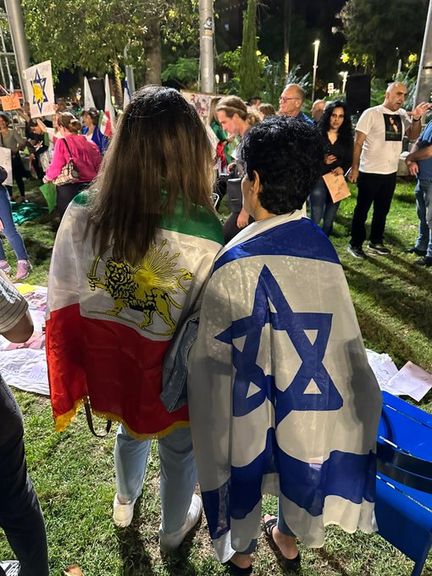
“Of course, when you have the overseas TV channels in your home all day, airing news that is biased in favor of the US and Israel, you can’t expect anything but this,” Imani said. He was referring to Persian-language broadcasters based abroad, such as Iran International, Manoto TV based in London, the Voice of America and BBC in Persian.
The Iranian regime has been on full-propaganda mode since the October 7 attack on Israel, praising Hamas and trashing Israel. Still, there’s been no outpouring of emotions for Palestinians, nor an authentic movement of solidarity in Iran.
But that’s not all. Many Iranians on social media have come out to back Israel, and some groups of Iranians outside Iran, have not only not marched in support of Palestinians, but taken risks showing up at pro-Hamas protests with pro-Israeli banners.
In London, for instance, a group of Iranians joined the rally in support of Israel, waving flags of pre-Revolutionary Iran. One Iranian activist took to the stage to offer her perspective to the crowd.
“The Islamic Republic, the supporter, trainer and the biggest funder of terrorism in the Middle East is holding my entire nation hostage,” said Leili Bazargan, an Iranian producer and activist.
“The people of Iran are on your side,” she claimed, referring to the crowd waving Israeli flags.
Similar instances have been reported in the past few days in the US, in Belgium, in Canada, and in Germany –where Iranians joined the front row of the marching crowd, holding the famous Lion and Sun flag of Iran pre-1979 and a picture of Reza Pahlavi, the heir to the last Shah of Iran.
There’s no real, open discussion in Iran about Israel and Palestine. The regime propagates its anti-Israeli policy with little subtlety.
Israel (or the “Usurper Zionist Regime” as the Islamic Republic officials call it) is a red line. No opposing view is tolerated, not even slight disagreements. It is hard, therefore, to gauge the public opinion on the ongoing war in Gaza. But Imani’s observation seems to be a rough guide of where many Iranians stand on the issue.
“No Gaza, No Lebanon, I shall die for Iran,” has been a recurring slogan in many protests in Iran for at least a decade. Many Iranians seem to resent the fact that their government spends money in Iraq, Syria, Lebanon or Palestine, while they’re suffering with an ailing economy.
This sentiment is by no means universal, of course.
Last week, Narges Mohammadi, who won the 2023 Nobel Peace Prize, issued a statement from prison, calling for a humanitarian ceasefire. However, some on social media criticized her for indirectly supporting the position of the regime. Israel and its supporters say that a ceasefire now would simply allow Hamas to regroup and continue to pose a threat.
“Attacks on innocent people, hostage taking, killing of women, children and non-combatants, targeting of hospitals, missile strikes on residential areas, have left the world in astonishment, horror and despair,” her statement read.
“With the power of global public opinion and the international unity of human rights defenders and peacemakers, though difficult, we can walk the path of peace, equality and freedom.”
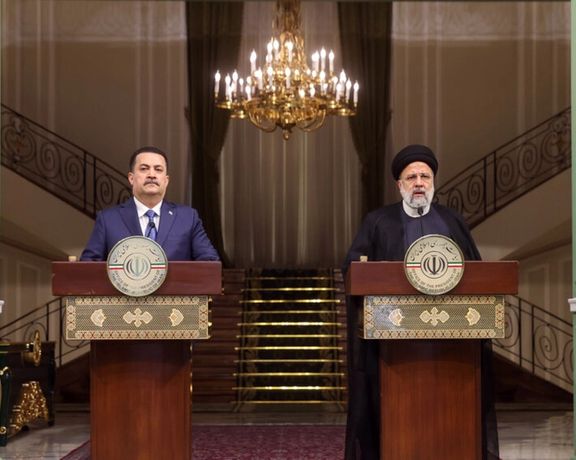
Iraqi Prime Minister Mohammed Shia al-Sudani arrived in Tehran early Monday, one day after US Secretary of State Antony Blinken visited Baghdad.
Al-Sudani was officially welcomed by president Ebrahim Raisi at Tehran's Saadabad palace, and held a joint press briefing after a meeting.
Iran’s official news agency IRNA quoted Raisi as saying that Tehran would welcome “any deterrent” measures by Islamic countries and regional states against Israel and the United States amid the conflict in Gaza.
The visit comes a day after al-Sudani met with Blinken, who visited Baghdad amid tight security following numerous drone and rocket attacks against US troops stationed in Iraq.
"It was very important to send a very clear message to anyone who might seek to take advantage of the conflict in Gaza to threaten our personnel here or anywhere else in the region: Don’t do it," Blinken told reporters after meeting al-Sudani.
Al-Sudani has pledged to pursue the perpetrators of rocket attacks on three military bases in Iraq hosting international coalition advisers, including Ain al-Asad in western Iraq, a military base near Baghdad's international airport and Harir in the northern Iraqi city of Erbil.
US forces shot down another one-way attack drone Sunday that was targeting American and coalition troops near their base in neighboring Syria, a US official said.
The US has warned it will respond to attacks by Iranian-backed groups. Iran has repeatedly called the US a "complicit" in what it describes as Israeli "war crimes" in Gaza, with Iranian foreign minister saying in late October that the US will not be "spared from this fire."

“Iran belongs to hardliners,” a recent remark on state TV, further fueled anger and frustration over the monopoly of power established by the regime loyalists.
An aspiring female hardliner politician, Mansooreh Masoumi-Asl, speaking in a television program, questioned the presence of non-hardliners on state TV, emphasizing, "This country belongs to Hezbollahis."
In the past 20 years, Iran’s so-called ultraconservatives and hardliners supported by the Revolutionary Guard and Supreme Leader Ali Khamenei have steadily increased their power in all state institutions.
Khamenei controlling all intelligence services and the courts first began closing a nascent bunch of relatively independent newspapers in early 2000s. Then he empowered the Revolutionary Guard to build an economic empire and a powerful intelligence organization. Hundreds of journalists were jailed in the past 20 years and an emerging civil society was eradicated by more arrests and court cases.
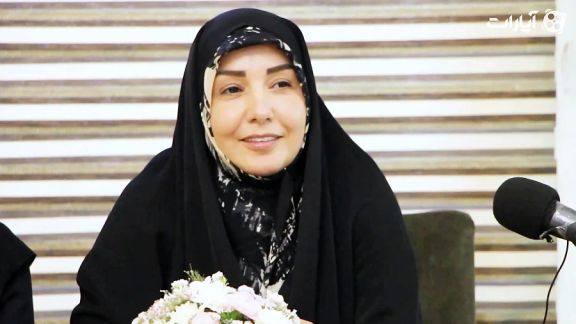
Finally, in the February 2020 parliamentary elections, most non-hardliner candidates were disqualified by the Guardian Council, a strange constitutional body tasked with vetting candidates. These individuals were already politicians loyal to the Islamic Republic, as those critical or opposed to the regime never had the chance to even express an opinion while in Iran.
The result in 2020 was that voter turnout declined, as there was no choice of so-called reformist candidates on the slates. In some districts, hardliners cruised to victory by just a few thousand votes. The same scenario happened in the 2021 presidential elections, when prominent candidates, including the former speaker of parliament, conservative Ali Larijani were disqualified and victory was handed to Khamenei’s hand-picked man, Ebrahim Raisi.
The blocking of all alternatives was part of the reason why nationwide anti-regime protests broke out in September 2022, which scared the core of the regime for a few weeks until mass killings and arrests re-assured them of their control over the angry populace. Immediately after control was restored the hardliners began a political “purification” purge by expelling scores of university professors, banning artists and writers and even replacing 20,000 school directors.
Regime insiders who are considered ‘reformists’ began sounding the alarm that most voters will not go to the ballot boxes in March, when a new parliament is scheduled to be elected. Many demanded assurances that the Guardian Council will not again block non-hardliners and allow some measure of competitive elections. But so far, the regime has offered no assurances.
The latest plea was heard from Mohammad Sadr, a long-time regime insider, who told Aftab News on Sunday that hardliners are harming the Islamic regime by their tribal behavior. “It is a fact that a high level of voter participation will boost the regime’s legitimacy,” ha argued and added, “and any group, organization or individual who prevents higher voter turnout, in reality is inflicting blows against the regime.”
Many commentators and reformists have argued that hardliners actually prefer to see voter apathy, because low turnout will ensure their victory in the elections.
However, even reformists are no longer seen as a viable alternative because it has been demonstrated in the past two decades that it is the radical core of the regime which makes all key decisions. Even a reformist parliamentary majority will be condemned to inaction by various pressures orchestrated by Khamenei’s office and the IRGC, pundits have said.
Mostafa Rostami, Khamenei representative in universities recently said that an opinion survey showed 83 percent of the population strongly object to the existing conditions in the country, although they did not participate in recent protests. Others have warned that in the next round of unrest there is no guarantee that the silent majority would remain silent.
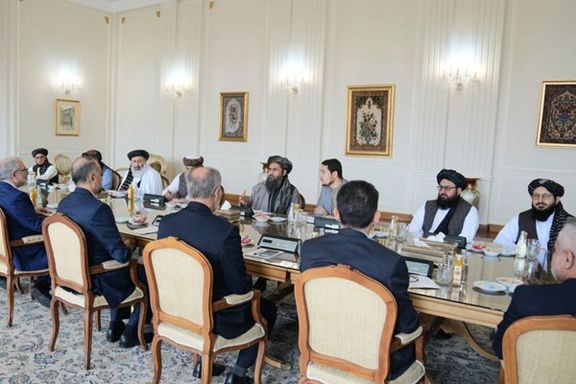
Amid impasse on issues such as migrants and water rights between Iran and Afghanistan, a 30-member Taliban “economic delegation” arrived in Tehran on Saturday.
The Afghan delegation is led by Abdul Ghani Baradar, First Deputy Prime Minister for Economic Affairs of Afghanistan and a co-founder of the Taliban along with Mullah Omar.
According to Afghan sources, the delegation, consisting of 30 Taliban officials, were to hold talks with Iranian authorities on trade, transit, transportation, infrastructure, and railways, as well as regional development and the issue of the growing number of Afghan migrants in Iran.
Iran’s capital Tehran hosted the delegation in the framework of an Iran-Afghanistan Joint Economic Committee meeting, the first after Taliban took over Afghanistan in 2021. Iranian Agriculture Minister Mohammad-Ali Nikbakht and President Ebrahim Raisi’s special envoy for Afghanistan Hassan Kazemi-Qomi were among the senior officials representing the Iranian side.
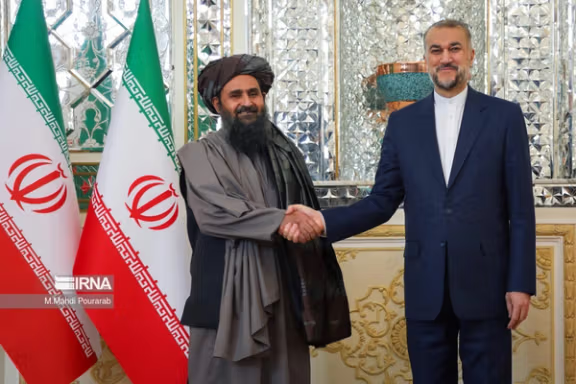
There is little concrete information about the outcome of the meetings, except calls to bolster relations and facilitate trade. However, among the more pressing issues in Tehran-Kabul ties are the issue Afghan migrants in Iran and water rights in eastern Iran, especially over Hirman/Helmand river that is the main source of irrigation water in western Afghanistan and eastern Iran. According to Iran’s state media the two parties agreed to form several taskforces to follow up on the issues of mutual interest.
Amid the escalating Hamas-Israel conflict, the visit by the Afghan delegation can also be related to security issues. Baradar also held a meeting with Iran’s top security chief Ali-Akbar Ahmadian, the Secretary of the Supreme National Security Council and a close aide to the Supreme Leader. "Afghanistan will not pose a threat to any of its neighbors," the Taliban official said according to IRNA.
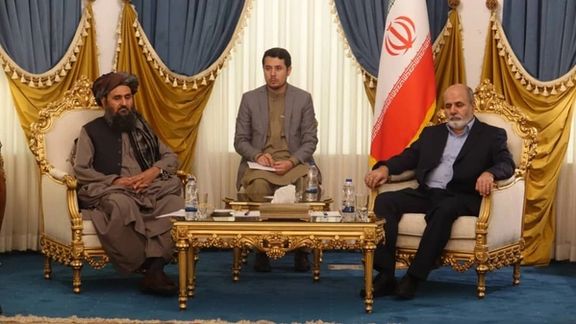
In August, an Iranian parliamentary delegation visited Kabul to address the water crisis in Sistan and Baluchestan, stemming from Taliban's Helmand River flow obstruction. Iran says that the Taliban have restricted the water flow to Iran's parched eastern regions, but this accusation is denied by the Taliban.
In the past few weeks, the the Iranian government’s critics have repeatedly warned about its “open borders” policy and the possibility of a hidden agenda, with hardliners responding to such criticism by accusing critics of inciting “Afghanophobia” amid fast-growing anti-Afghan sentiments on social media and violence against the immigrants.
The Islamic Republic adopted an unprecedentedly lenient approach to Afghan migration when hardliner President Ebrahim Raisi took office in Iran two years ago and the Taliban formed a government in neighboring Afghanistan.
Some government critics claim authorities are actively encouraging illegal Afghan immigration to remedy the problem of population decline or even to bolster its military by recruiting young Shiite Hazara Afghans.
The IRGC-linked Fars news agency has accused a “shadowy political group” of seeking to cause tension between the Islamic Republic and the Taliban by expressing concerns about the increase in the number of Afghans in Iran.
As the debate intensified, Iran's interior minister insisted that the number of Afghans has reached 5 million, but others in local media countered that the refugees are as many as 8 million or even higher. That would be around 10 percent of Iran's population.
In April 2021, Foreign Minister Hossein Amir-Abdollahian said one million more Afghans had entered Iran since the Taliban took power in August the previous year, bringing Iran’s official number of refugees and economic migrants to five million.
In a commentary in July, Aftab News, a website close to former President Hassan Rouhani and the moderate conservative Moderation and Development Party, warned that “the massive increase in the number of Afghans” is the result of authorities' active policy to encourage the growth of the Afghan population including allowing them the right to buy property and access to services such as education and healthcare.
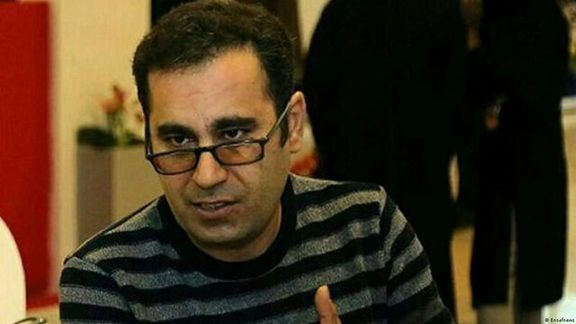
Mohammad Habibi, the spokesperson of the Teachers' Association of Tehran, is to stand trial for protests against the poisoning of female students.
The Coordination Council of Iranian Teachers' Trade Associations declared on Sunday that the trial begins on January 10 in the second branch of the Revolutionary Court in Shahr-e Rey.
The charges against him are "participation and collusion in committing a crime against domestic/foreign security".
Habibi, known for his involvement in cultural and educational activism, was detained in April by Ministry of Intelligence officers. He was released more than a month later after posting bail from Evin Prison's Ward 209.
The chemical attacks on girls' schools began in November 2022, affecting hundreds of schools and thousands of students.
In the initial months, the Islamic Republic denied the chemical attacks on schools. Later, they downplayed the incidents, shifting blame onto the students for the poisonings. Simultaneously, there was an increase in pressure on the media and civil activists to curtail information dissemination on the matter.